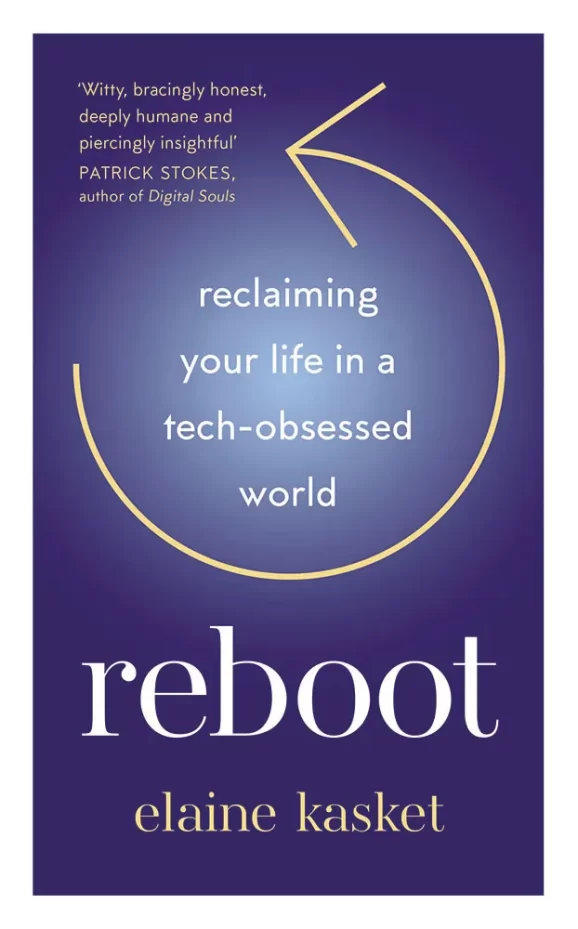Time to confront your inner Luddite?

John E. Kaye
- Published
- Home, Technology, Uncategorized

Personality, life stage, and mindset all influence our willingness to embrace rapid technological change, says cyberpsychologist Elaine Kasket
The original Luddites were disgruntled weavers in early 19th century England, afraid that cutting-edge knitting machines would cost them their jobs. They attacked factory floors in the dark of night, smashing the new frames to smithereens. Not anti-innovation per se, they were simply desperate to protect their jobs in a rapidly escalating industrial revolution.
Thomas Pynchon recalled that era in his famous 1984 essay, ‘Is it O.K. to be a Luddite?’ “Now we live, we are told, in the Computer Age,” Pynchon said, “Will mainframes attract the same hostile attention as knitting frames once did?”
The original Luddites’ rage against the machine was driven by fear, and particularly since OpenAI burst upon the scene, many professionals have become nervous about their job security, including: accountants, legal professionals, educators, creatives, and people working in media, tech, and finance. Staring down the barrel of ChatGPT, we’re confused by conflicting messages about the scale or nature of the danger. As we grapple with unpredictability and the uncontrollable, our threat systems are put on high alert.
That said, even in those professions most likely to be imminently affected by AI, not everyone is reacting with fear and loathing. Personality, life stage, and beliefs about technology all influence how well an individual adapts to fast-paced technological change.
Personality affects how we view technological change
If you’ve ever taken a personality test, it was likely based on what’s known as the Big Five: Openness to Experience, Conscientiousness, Extraversion, Agreeableness and Neuroticism. Where you sit on the Openness to Experience (OE) scale significantly affects your response to change, and I witnessed this first-hand during Covid-19 lockdowns.
Many of my clients pivoted agreeably to online psychotherapy sessions, first with curiosity and then with gratitude about how well it could work for them. Others, clearly lower on OE, refused help during lockdown simply because it was being delivered online, opting to wait for the “return to normal” despite being in distress. One woman in older midlife refused to join the Zoom coffees and online exercise classes to which she was invited, fearful that the virtual nature of the interactions would contaminate her enjoyment. Some of my fellow psychologists resisted moving their practices online for similar reasons, insisting that the tech would prevent “real relating”.
Personality heavily influences our behaviour when we’re on automatic pilot, but we can be more flexible when we’re self-aware. It is also important to note that we’re maximally malleable as children, but that our personality becomes more stable as we move through our twenties and thirties. During midlife, personality reaches “peak stability,” particularly Openness to Experience.
The influence of life stage
People in the 40-65 age bracket now straddle the line dividing what sociologist Marc Prensky once distinguished as “digital immigrants” and “digital natives”. While those born prior to 1985 may embrace and function well within a digital world, Prensky argued that they’ll be forever saddled with at least a slight digital-immigrant “accent”, betraying the analogue world in which they came of age.
The influential lifecycle theorist Erik Erikson said that the challenge of the middle adulthood years is “Generativity vs Stagnation”. However, he built his theory and described generative midlife – building a legacy, putting down roots, and hitting your stride at work – during the 1950s. At that point, “jobs for life” were still a thing. Today’s midlifers were likely encouraged as children to choose jobs and careers based on predictability and stability. Nobody prepared them for the gig economy, multi-hyphenate lifestyles, or technological innovations so dizzying that, in the prime of their working years, a huge number of them would need to upskill, pivot, or completely reinvent their careers at the developmental stage when people tend to be least psychologically flexible.
We can thank Erikson for the phrase “midlife crisis”. Such crises occur because we still crave and need movement, expansion, and evolution during midlife, yet may still feel the impulse to hang on to how things were; still wish that nothing had to alter at all; and still fear irrelevance and unemployability. At this moment, the whole world of work is having its own midlife crisis. For someone going through their forties, fifties, or early sixties at this point in history, these wider-scale disruptions can either stoke excitement or feel like double trouble.

The centrality of attitudes and beliefs
To paraphrase Hamlet, technology is neither good nor bad, but thinking makes it so. Whatever our personality or age, it’s not the tech itself that determines our experience, but how we choose to see it.
For example, the term PROI stands for “perceived reality of online interaction”. High-PROI versus low-PROI individuals may experience the same innovation in completely different ways. High-PROI people see a Zoom conversation as potentially just as fulfilling and relationally deep as a physical, face-to-face interaction; they focus not on whether technology can provide them with what they want from the exchange, but how they can use the tech to get their needs met. In contrast, low-PROI people assume online contact will be inherently less real, good, and valid compared with physically co-present interaction; they believe that tech will condemn them to an inferior experience, and that they have no agency in the matter.
Now, we probably need to establish new acronyms for people with positive or negative beliefs about AI, automation, hybrid working, productivity tracking, and employee surveillance. In all these aspects we can be willing to explore and even embrace, or we can reflexively resist and reject. If your default reactions are in the latter camp, succumbing to that fear may very well drag you down into stagnancy. But if you’re self-aware enough to move past your knee-jerk responses, you can find the freedom to change your behaviour.
On the arrival of ChatGPT, for example, some lecturers declared the death of the essay and moved to other methods of assessment, bemoaning the demise of student writing and critical thought. Other educators, rattled but not daunted, chose to remain curious about how they and their students could use ChatGPT, creating all manner of novel exercises and assignments employing it.
Choosing the change
Confronted with wondrous inventions that were the stuff of science fiction during some of our pre-digital childhoods, it’s easy to feel helpless and victimised by technology. But neither generativity nor stagnation can be forced upon us. Even in the most uncertain or difficult moments, there is always a greater range of internal and external responses available to us than we imagine.
To stay maximally generative, and to evolve with and alongside technology, we should nurture this mindset: whether you’re naturally a low-PROI neo-Luddite or a high-PROI technophile, you always have more freedom to respond than might initially appear. When a technological innovation could potentially serve you well but initially threatens or befuddles you, you could instinctively avoid it, or you could take a chance and lean into it. Actual experience with something will always lead you to better choices and opportunities in your working life than your fear-driven speculation, or your pre-existing beliefs and assumptions.
The built-in flexibility of tall buildings keeps them from toppling when the wind blows. Because trees can bend, they can survive and continue to grow despite the storms. Certainly, your personality, pre-existing assumptions, and stage of life may sometimes make it less easy for you to roll with the punches. Nevertheless, you retain these freedoms, if you choose to realise them: the option to choose an open-to-experience response; the opportunity to cultivate curiosity; and the chance to confront your inner Luddite at the moment it might matter the most.
About the Author


Elaine Kasket is a psychologist, speaker and coach. Her new book, ‘Reboot: Reclaiming Your Life in a Tech-Obsessed World’, is out now, published by Elliott & Thompson.
RECENT ARTICLES
-
 AI-driven phishing surges 204% as firms face a malicious email every 19 seconds
AI-driven phishing surges 204% as firms face a malicious email every 19 seconds -
 Deepfake celebrity ads drive new wave of investment scams
Deepfake celebrity ads drive new wave of investment scams -
 Europe eyes Australia-style social media crackdown for children
Europe eyes Australia-style social media crackdown for children -
 Europe opens NanoIC pilot line to design the computer chips of the 2030s
Europe opens NanoIC pilot line to design the computer chips of the 2030s -
 Building the materials of tomorrow one atom at a time: fiction or reality?
Building the materials of tomorrow one atom at a time: fiction or reality? -
 Universe ‘should be thicker than this’, say scientists after biggest sky survey ever
Universe ‘should be thicker than this’, say scientists after biggest sky survey ever -
 Lasers finally unlock mystery of Charles Darwin’s specimen jars
Lasers finally unlock mystery of Charles Darwin’s specimen jars -
 Women, science and the price of integrity
Women, science and the price of integrity -
 Meet the AI-powered robot that can sort, load and run your laundry on its own
Meet the AI-powered robot that can sort, load and run your laundry on its own -
 UK organisations still falling short on GDPR compliance, benchmark report finds
UK organisations still falling short on GDPR compliance, benchmark report finds -
 A practical playbook for securing mission-critical information
A practical playbook for securing mission-critical information -
 Cracking open the black box: why AI-powered cybersecurity still needs human eyes
Cracking open the black box: why AI-powered cybersecurity still needs human eyes -
 Tech addiction: the hidden cybersecurity threat
Tech addiction: the hidden cybersecurity threat -
 Parliament invites cyber experts to give evidence on new UK cyber security bill
Parliament invites cyber experts to give evidence on new UK cyber security bill -
 ISF warns geopolitics will be the defining cybersecurity risk of 2026
ISF warns geopolitics will be the defining cybersecurity risk of 2026 -
 AI boom triggers new wave of data-centre investment across Europe
AI boom triggers new wave of data-centre investment across Europe -
 Make boards legally liable for cyber attacks, security chief warns
Make boards legally liable for cyber attacks, security chief warns -
 AI innovation linked to a shrinking share of income for European workers
AI innovation linked to a shrinking share of income for European workers -
 Europe emphasises AI governance as North America moves faster towards autonomy, Digitate research shows
Europe emphasises AI governance as North America moves faster towards autonomy, Digitate research shows -
 Surgeons just changed medicine forever using hotel internet connection
Surgeons just changed medicine forever using hotel internet connection -
 Curium’s expansion into transformative therapy offers fresh hope against cancer
Curium’s expansion into transformative therapy offers fresh hope against cancer -
 What to consider before going all in on AI-driven email security
What to consider before going all in on AI-driven email security -
 GrayMatter Robotics opens 100,000-sq-ft AI robotics innovation centre in California
GrayMatter Robotics opens 100,000-sq-ft AI robotics innovation centre in California -
 The silent deal-killer: why cyber due diligence is non-negotiable in M&As
The silent deal-killer: why cyber due diligence is non-negotiable in M&As -
 South African students develop tech concept to tackle hunger using AI and blockchain
South African students develop tech concept to tackle hunger using AI and blockchain



























